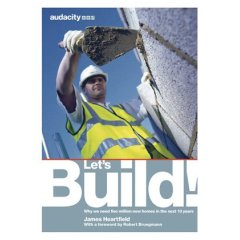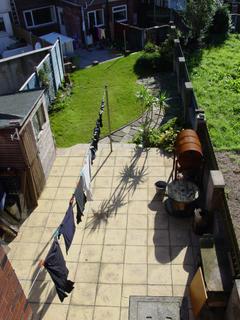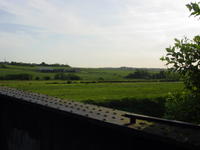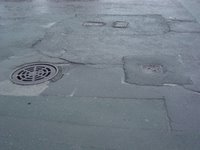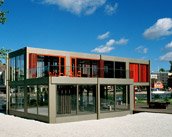

Whilst there is no objection to the developer building (particularly as he is a generous donor of a football team once 'hung around' with . . ) it’s more that we should be a bit more selfish about what goes on in our backyard. After all our houses have considerable influence in our lives and possibly set to be even more so. Therefore isn’t it timely that we consider what informs house building practice and its relevance to us?
*
This open letter forms the basis of an objection to planning application No. 06/99/484444/B - an outline proposal for the development of 27 apartments, off Millfield Road on land previously used as factory space.
This is a NIMBY complaint and deliberately so, although it aims for a wider remit. Versions of this letter will be widely dispersed and a housing survey is forthcoming.
As yet this letter forms no public campaign. Given the choice the local community would likely prefer housing instead of a working factory and all its busy comings, goings and 'intrusions'. Why not do everyone a favour and move the remaining industry to the ex-Bombardier works?
This objection is based on the notion that this type of housing and its siting is unnecessary, overpriced, old hat, based on false premises and represents a disservice to us, the taxpayer, and the wider community. More so than that, it neither bodes well for the would be occupants nor the notions behind it for the economy paying for it.
Overpriced rabbit hutch housing plus an economy aiming for diminished wants, the creation of erstatz heritage and legalised community.
Unnecessary because there is no actual shortage of land - merely a question of how it is used as a resource. In supposedly overun Britain we are merely 12% 'built", the rest - 75% Agriculture, and the other 13% preserved, relic and other.
'Other' including such gems as The Yorkshire Dales National Park. Something of a favourite of mine. Wide valleys carved by glacier , natural forestry removed for sheepfarming and early source of Yorkshire prosperity, inclusive of many a ruin of earlier occupation, development and industry; erratics and other features. Now, farmed and preserved in some incoherent view of history.
Constant gains in agriculture mean that what we view as a traditional farming landscape is obsolete - a romantic idyll; a man-made, inefficient patchwork, and all supported by the taxpayer.
Ah, the taxpayer!
5% of the population in this way own 95% of the land, the EUs farming budget eats 40% of the total and we live in old and/or expensive houses.
Even the Royal family receive farming rebates (of one form or another) and farmers are paid compensation to leave land to return to the wild.
Telling figures - African farmers receive $200 conditional subsidy per year whereas european cattle are subsidised to the tune of $937. Here too domestic influence is reflected by its continental counterpart and the vision of restricted development for what is ironically refered to as the developing world.
A developing Africa would unlock huge land and other natural resorces/raw materials. That is if it shakes off the white man's burden in the phantom of sustainable development. And corrupt, self serving government.
Back home.
At home this deliberate restriction of land means that prices are unnecessarily high and for what can be poor quality. And the resultant houses and landworks 'jerry built' as what is known as The building lndustry goes gung-ho to make its rapacious gains.
l don't think they're rapacious enough. Design criteria and density regulations mean that they are forced to operate within narrow confines and UK design and build though capable of remarkable things is largely haphazard at best but outmoded and inefficient in the main.
Bearing in mind the central role that housing plays in the economy methinx this doesn't bode well for the long run and Britain will be outpaced by external developments.
This at a time when there is plenty of room for maneouvre but just a niggardly view of our impact on the environment. As such it displays intellectual bankruptcy, moral cowardice and a lack of will.
Practical objections to this proposed development are the quality of land and accompanying infrastructure that is archaic and overburdened - this in 'affluent' Horbury.
This type of build needs rejecting everywhere as an unneccesary intrusion and the developments returrned to open areas, parkland and amenities - living room.
My own pet project is landscaped parkland down to the riverfront. Perhaps a floodplain bay area and boathouse.
There is neither a genuine objection to housing going on any of this land. l'd be happier if experimental forms in housing were tried, maybe with landscaping; either as temporary exhibition and showcase for UKs latent design capacity and to act as fillip for industry.
Perhaps it's worth considering how we live positively affects further innovation and development.
Coxley Valley is a local area of some 'natural' beauty and is an attraction for many. But anything special? Other than mud, trees, babbling brooks, wildlife and swooping farmland, not really.
Officially it's use is limited yet it has long been a playground for the rambler, cyclist, dogwalker and dambuilder - we do like the countryside and many of us dream of living nearer or in it. And why not? Coxley Valley could support some highly desirable residences and very nice locations; or perhaps landscape more Coxleys with housing.
A transitional program could see the destruction of swathes of old stock housing, bulk modernisation of others with more open spaces and a rebuild program. Newer developments in housing, urban and rural planning could also reinvigorate road and transport design and drive the UK out of its demoralising slumber.
A huge undertaking? Possibly so, but the UK, for whatever reason, still features large in the world. Apart from the negatives there is the 2012 Olympics, the possibility of a World cup and who knows what else in the pipeline?
